Recycling Plastics – Less Hazardous on the Environment
You’ve probably walked past a pile of garbage and cringed at the sight and smell. It’s not just an eyesore; it attracts pests and rodents that can spread diseases. A lot of the trash in Belize is made up of recyclable materials, like plastics. Plastic bags, for example, take ten to twenty years to break down, lingering in the environment. Studies show that plastics and microplastics have infiltrated all levels of the ocean’s food chain and are also clogging our drainage and waterways in Belize. Plastics can bind with harmful chemicals, known as persistent organic pollutants, which pose a threat to the reproductive systems, growth, and health of animals that consume contaminated food. Plastic bottles can take hundreds of years to decompose. In this edition of our Five Point Breakdown, News Five explores the issue of plastic waste and how recycling efforts can help mitigate its environmental impact. Here’s Marion Ali with the report.
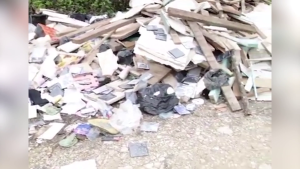 Marion Ali, Reporting
Marion Ali, Reporting
Plastics – they’re absolutely everywhere! Whether you’re at home, in the office, or shopping at the supermarket, you can’t escape them. They’re probably the most common items you’ll find in any building, unless there’s a ban in place and alternatives are being used. While many countries see plastics as a necessary evil, there are ways we can cut down on the plastic waste we generate. Dr. Arlenie Rogers, an Assistant Professor in Marine Biology at the University of Belize, suggests two key strategies: one proactive and the other reactive.
Minimizing Plastic Waste by Education & Recycling
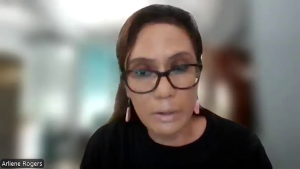
Arlenie Rogers
Dr. Arlenie Rogers, Assistant Professor, Marine Biology, U.B.
“If we educate people, people will know, people will become more aware on how to recycle, but if we don’t have the right legislation in place, for example, a requirement where we have to separate our garbage into recyclables and garbage that cannot be recycled, then it’s going to be easier for people that collect recycling products at the landfill, or sorry, not at the landfill, at the transfer stations. And they will have less exposure to chemicals and other dangerous materials when garbage is all in one bag.”
Marion Ali
“One company in Belize wants to make a difference with the plastic garbage that we produce. Businessman Freddy Oriana is hoping to seek funding to be able to expand his Belize Recycling Company Limited at mile eight on the George Price Highway to be able to convert the plastic garbage into building materials such as plastic wood.”
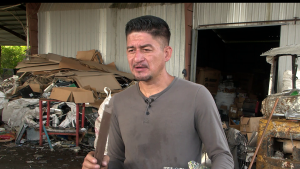
Freddy Orellana
Freddy Orellana, Owner, Belize Recycling Company Ltd.
“Mostly it’s the wood because you can make it different sizes and for different purposes too. You can build garbage bins, you can build chairs, you know, like picnic tables and things like that.”
Orellana shared that his company used to buy plastic waste to export to Guatemala, where it would be transformed into useful items. However, with the drop in purchasing prices, he’s had to hit pause on that part of the business. Despite this, he’s still happy to accept plastic donations, storing them with the hope that his recycling dream will soon come to life. His goal? To produce plastic wood as a sustainable building material.
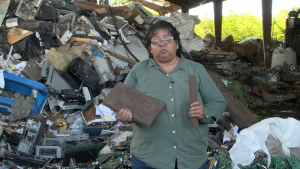 Freddy Orellana
Freddy Orellana
“If people want to bring it and donate it here, we process it and we file it and bail it and keep it. We visited various businesses in other countries, and they have strewing machines that have different molds, and we can use all the plastics to make this that we call plastic wood. You can add different colors, you can make different shapes. You can even build houses with it. This has a lot of benefits because it’s fire resistant, like bullets will be really hard to work through it.”
Orellana mentioned that plastic wood is actually tougher for bullets to penetrate compared to regular lumber.
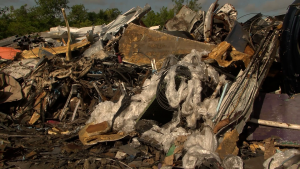 (The Benefits of Building with Plastic Wood)
(The Benefits of Building with Plastic Wood)
Freddy Orellana
“We had here a robbery at night and then somebody came with a gun and shot at the security guard, and then it went through the wood, but it wouldn’t go through this. So, this basically saved the person’s life.”

Luis Garcia
Luis Garcia, President, Belize Recyclers and Waste Management Association
“We’re gearing towards being that loophole between the private sector and government – that crossroads of building recycling opportunities in Belize. When we mean recycling, we mean doing recycling in Belize and selling recyclables out of Belize.”
Luis Garcia, the president of the newly formed Belize Recyclers and Waste Management Association, leads a group of over twenty passionate individuals and businesses united by a single mission: cutting down on plastic waste. They are currently exploring ways for Belize to make some cash by exporting plastic waste.
(Exploring Plastic Garbage as Part of Circular Economy)
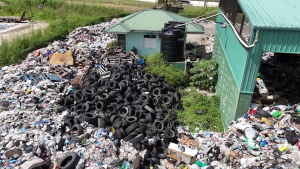 Luis Garcia
Luis Garcia
“We have an interest from Taiwan of buying all the plastic bags from the banana industries, and we’re looking at tons of plastics there. So there is an interest there. There’s also an interest on the pet plastic, which is what is used for soft drinks. So we do have a lot of, interests that are already on the table, but we still need to put everything together and to make sure that we meet the volumes that make it sustainable. By just picking up a few crocus bags here and there, we just have to sell it to the nearest buyer, which would be Guatemala or Mexico. But if we can actually put everything together, all the efforts together and put policy in order, then we can actually build a recycling opportunity for Belize and develop recycling as a business and not just as an environmental willingness of people.”
Dr. Rogers believes that if Belize had laws requiring us to separate our garbage, it would make everyone responsible for not just reducing, but also organizing the waste we create, much of which is plastic.
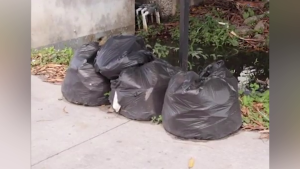 (Separating Garbage Protects Recyclers)
(Separating Garbage Protects Recyclers)
Dr. Arlenie Rogers
“When we put our garbage in the drum, like in the cities and the towns, everything is in one. In other countries, their laws require people to separate their garbage. They separate organic waste, they separate plastic waste, they separate cans, they separate bottles. Everything is separated. So when the collection truck comes, it’s separated. If we were to have that in Belize, the people that are at the transfer station, the people that the recyclers, they would be less exposed to, you know, many chemicals that come with the garbage.”
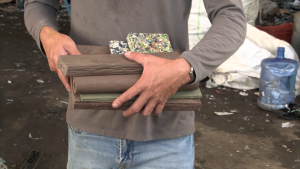 Dr. Rogers thinks Belize needs to tighten up its laws for businesses that handle plastic containers. It’s time to get serious about regulating plastic use.
Dr. Rogers thinks Belize needs to tighten up its laws for businesses that handle plastic containers. It’s time to get serious about regulating plastic use.
Enforcing the Laws on Businesses
Dr. Arlenie Rogers
“What needs to be done is to ensure that those companies that market themselves as producer of biodegradable products, that they are really complying, that they are indeed making biodegradable products. Secondly, Belize also needs to extend the enforcement of the Returnable Containers Act, because the Returnable Containers Act looks at glass and other beverage containers, and beverage containers are not only made of glass, they are made of plastic, they are made of metal. So if you want to minimize plastic, then the enforcement needs to be done on other companies and other distributors that are importing beverage containers that are producing plastic.”
Under current law, anyone caught importing restricted plastic products faces a hefty fine. They could be fined at least a thousand dollars or three times the value of the imported goods, but the penalty won’t exceed twenty thousand dollars. Marion Ali for News Five.






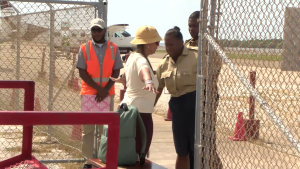
Facebook Comments